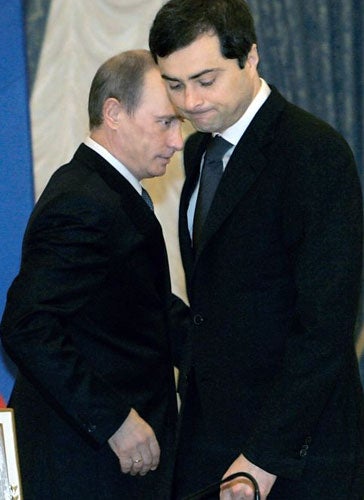Did Kremlin political chief really write murky gangster novel?
Vladislav Surkov used pseudonym to tell tale of corruption at heart of power

Close to Zero is the tale of a Russian publisher operating in a murky political system featuring paid-off media, corrupt officials, dubious politicians and law enforcement agencies on the take.
The short novel was published last month and passed unnoticed until yesterday, when a newspaper reported that its author was none other than the Kremlin's chief political strategist Vladislav Surkov, writing under a pseudonym.
Mr Surkov, a shadowy figure who rarely speaks in public, wields immense influence. His role as deputy head of the Kremlin administration for the past 10 years under both Vladimir Putin and Dmitry Medvedev puts him at the centre of political power.
In the novel, which advertised itself as gangster fiction, the main character Yegor Samokhodov orders a poet to write verse in the name of the regional governor to make the official look clever and win an award. Samokhodov, a publisher who does a sideline in political public relations, then tries to bribe a female journalist at an opposition newspaper to "correct" stories about damage to children's health from a toxic chemical factory owned by the governor's relative.
Fact or fiction?
The events portrayed are everyday fare in Russia, where local media sometimes take money in return for favourable coverage and those in power believe they can bribe or bully their way to victory in almost any situation.
A source at the Russky Pioner magazine which published the novella confirmed that the story was Mr Surkov's work. "Yes, it was him," the source said on condition of anonymity because of the sensitivity of the issue.
The Kremlin denied he had authored the novel. "He definitely didn't write it," said a spokesman. But media reports pointed out that the pseudonym used – Natan Dubovitsky – is almost identical to the name of Mr Surkov's second wife, Natalya Dubovitskaya.
The author of Russia's doctrine of "sovereign democracy" which touts a strong, organised state at the centre of the political machine guarding against chaos and foreign meddling, Mr Surkov often rails against Western "lies" in portraying Russia. "Our partners ... tell us about democracy while thinking about our hydrocarbons," he told foreign journalists in his last news conference with them in 2006.
Andrey Kolesnikov, the editor-in-chief of Russky Pioner and also Russia's best-known political correspondent, said he had decided to publish the work because of its artistic quality, despite not knowing who wrote it.
"I received the text by email with a request from the author that he was interested in my opinion," he said. "I really liked the novel. I am convinced it is a work of quality ... for the author, it was an act of self-discovery".
In one revealing part of the story, the opposition journalist Nikita Mariyevna tells Samokhodov she hates those in power – a "greasy crowd" of governors, deputies, ministers, security service officials and police. But the book's hero replies: "It's not those in power you hate, but life". He goes on to explain that unfairness, the use of force and stagnation are just part of life and urges her to live with this rather than try to destroy it.
Analysts speculated that Mr Surkov might have written the book as a signal to the main pro-Kremlin party United Russia that times could be changing and they might face greater political competition in future.
Mr Surkov worked as a public relations consultant in the 1990s. Among his patrons was the now disgraced oil tycoon Mikhail Khodorkovsky.
Join our commenting forum
Join thought-provoking conversations, follow other Independent readers and see their replies
Comments